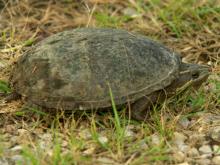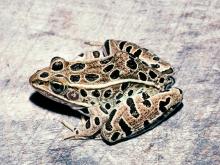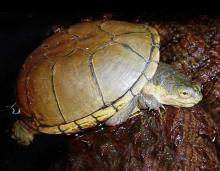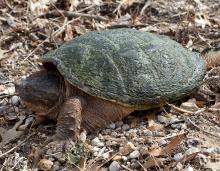Reptiles and Amphibians
Media

Species Types
Scientific Name
Sternotherus odoratus
Description
The eastern musk turtle is one of the world’s smallest turtles. It has a dark, domed upper shell and reduced lower shell. It occurs along our Mississippi River counties and in the southern two-thirds of the state.
Media

Species Types
Scientific Name
Chrysemys picta bellii
Description
The western painted turtle is a small, brightly colored aquatic turtle. The upper shell is smooth and has a red-orange outer edge. The colorful lower shell has a prominent pattern of brown markings. It is found nearly everywhere in the state except the southeast region.
Media

Species Types
Scientific Name
Kinosternon subrubrum hippocrepis
Description
Although well equipped for an aquatic existence, the Mississippi mud turtle spends as much time wandering about on land as it does in water. Look for it in the Mississippi Lowlands of Missouri’s Bootheel.
Media

Species Types
Scientific Name
Lithobates pipiens
Description
The northern leopard frog is a medium-sized frog with dark spots on the back. Two skin folds run down each side of the back. In Missouri, it only occurs in a few northwestern counties along the Iowa border.
Media

Species Types
Scientific Name
Anaxyrus woodhousii woodhousii
Description
The Rocky Mountain toad has a number of irregular dark brown or black spots on the back and a white belly. It occurs in the Missouri River floodplain, mostly from the central to the far northwestern parts of the state.
Media

Species Types
Scientific Name
Thamnophis sirtalis sirtalis (eastern gartersnake) and T. s. parietalis (red-sided gartersnake)
Description
The eastern gartersnake and red-sided gartersnake are Missouri's most common gartersnakes. The color is variable, but there are normally three yellowish stripes, one down the back and one on each side. There are narrow black bars between the scales along the upper lip.
Media

Species Types
Scientific Name
Kinosternon flavescens
Description
The yellow mud turtle is a small, uniformly colored, semiaquatic turtle restricted to certain counties in west-central, northeastern, and southwestern Missouri. It is an endangered species in our state.
Media

Species Types
Scientific Name
Chelydra serpentina
Description
A large aquatic turtle with a big pointed head, long thick tail, and small lower shell, the eastern snapping turtle is common throughout the state, anywhere there is permanent water.
Media

Species Types
Scientific Name
Ambystoma annulatum
Description
The ringed salamander is secretive, spending most of its time under logs or rocks or in burrows. The rings never completely encircle the body. It occurs in the southwestern and central Missouri Ozarks, and in the river hills of the Missouri River in eastern Missouri.
Media

Species Types
Scientific Name
Ambystoma maculatum
Description
The spotted salamander is one of Missouri's six species of mole salamanders. It is slate black with two irregular rows of rounded yellow spots from the head onto the tail. It occurs in forests in the southern two-thirds of the state.
See Also
About Reptiles and Amphibians in Missouri
Missouri’s herptiles comprise 43 amphibians and 75 reptiles. Amphibians, including salamanders, toads, and frogs, are vertebrate animals that spend at least part of their life cycle in water. They usually have moist skin, lack scales or claws, and are ectothermal (cold-blooded), so they do not produce their own body heat the way birds and mammals do. Reptiles, including turtles, lizards, and snakes, are also vertebrates, and most are ectothermal, but unlike amphibians, reptiles have dry skin with scales, the ones with legs have claws, and they do not have to live part of their lives in water.





















